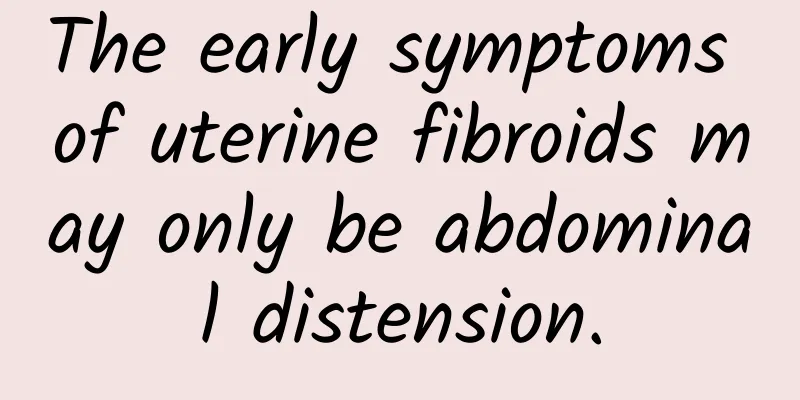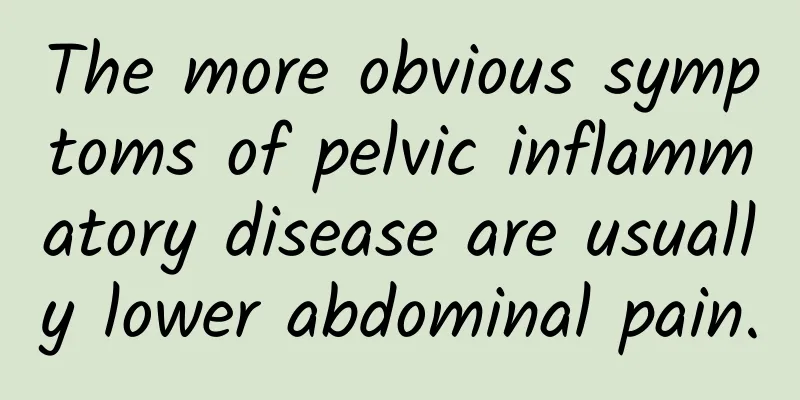What causes abdominal pain after menstruation?

|
Lower abdominal pain after menstruation may be related to gynecological diseases, gastrointestinal inflammation or physiological factors. Understanding these causes can help us better cope with and prevent this discomfort. 1. Gynecological diseases: Lower abdominal pain is sometimes caused by pelvic inflammation, such as endometritis, oophoritis or salpingitis. These diseases are usually accompanied by symptoms such as tenderness, rebound pain, increased vaginal discharge and leucorrhea odor. In severe cases, backache, back pain or anal prolapse may also occur. If you find yourself having these symptoms, it is best to see a doctor as soon as possible to get a professional diagnosis and treatment. 2. Gastrointestinal inflammation: Women's body resistance may decrease after menstruation, which makes them more vulnerable to bacteria and viruses, leading to gastrointestinal inflammation. If you feel pain in your lower abdomen after menstruation and are accompanied by other gastrointestinal discomfort symptoms, such as diarrhea or nausea, consider the possibility of gastrointestinal disease. 3. Physiological factors: Sometimes, abdominal pain after menstruation may be related to some physiological factors. For example, cold abdomen, excessive consumption of raw, cold or irritating food, and bad living habits. These factors may cause abdominal discomfort and pain. In order to avoid this situation, it is recommended to keep warm during and after menstruation, eat less raw and cold food, and maintain good living habits. 4. Relief methods: If you feel pain in your lower abdomen after menstruation, you can try some simple methods to relieve the discomfort. For example, keep your abdomen warm, drink some warm water, try to relax, avoid strenuous exercise, etc. If the pain persists or worsens, it is recommended to see a doctor in time for relevant examinations. 5. Preventive measures: In order to reduce the occurrence of lower abdominal pain after menstruation, you should pay attention to maintaining good living habits and eating habits. Proper exercise can enhance physical fitness and improve resistance. Pay attention to a balanced diet, eat more fiber-rich foods, and avoid eating too much spicy and irritating foods. Understanding the possible causes of lower abdominal pain after menstruation and the corresponding coping strategies can help us better protect our health. If the pain persists or is accompanied by other abnormal symptoms, it is very important to seek medical attention in time. I hope these suggestions can help you better deal with lower abdominal pain after menstruation. |
<<: Will uterine fibroids cause abdominal pain?
>>: Long-term consequences of untreated cervical erosion
Recommend
Eat like this on the ketogenic diet ~ DIY braised pork trotters to replenish fat!
★ Braised pork trotters Difficulty: ☆. Nutritiona...
Is it risky to have an abortion with a scarred uterus? Can I still get pregnant?
The risk of abortion with a scarred uterus is hig...
What are the causes of pelvic inflammatory disease
Pelvic inflammatory disease is a common gynecolog...
Causes of vaginitis in young girls
Vaginitis in young girls refers to a type of dise...
How big does a uterine fibroid need to be surgically removed? What are the classifications of uterine fibroids?
Introduction to this article: How much uterine fi...
The probability of recurrence of ectopic pregnancy after conservative treatment of ectopic pregnancy
Ectopic pregnancy refers to pregnancy in an ectop...
What are the treatments for cervicitis?
Cervicitis is one of the common gynecological dis...
Things to pay attention to in daily life regarding cervical hypertrophy
Everyone wants to have a healthy body, but there ...
What diseases will be caused by not having surgery on uterine fibroids? What will happen if uterine fibroids are not operated on?
Uterine fibroids are a common gynecological disea...
Things women should pay attention to after abortion
Abortion is harmful to women's health, and mo...
Sour plum polyphenols help burn fat! 2 recipes to lose weight while eating
In June 2010, Sapporo Beer (Sapporo Beer, one of ...
How to prevent adnexitis during menstruation
Adnexitis refers to inflammation of the fallopian...
Warm up before exercise to warm up muscles and prevent strain and speed up fat burning
[Key Points]: Warming up before exercise can not ...
Will I have my period if I have an incomplete abortion? How long will it take for me to have my period after a medical abortion?
How long does it take to get menstruation after a...
Why do women suffer from recurrent cervical erosion? Five reasons make cervical erosion difficult to cure
What is the reason why cervical erosion recurs an...









